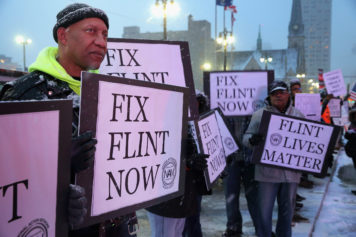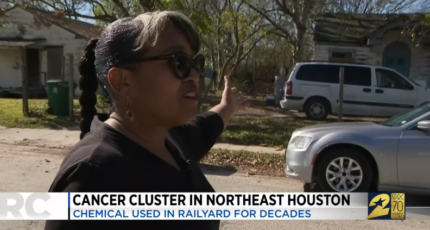Who will hold America accountable for its crimes against humanity? The water austerity measures in Detroit, and the lead poisoning crisis in Flint – of which the latter has led to federal class-action lawsuits and a Racketeer Influenced and Corrupt Organizations suit against Michigan Gov. Rick Snyder — confirm the presence of a national human rights disaster. As President Obama prepares to visit Flint on May 4, there is much to consider.
Water is basic to life and human existence, and yet the U.S. — the world’s largest economy and richest nation — fails to provide its people with adequate water. The land of the free exacts a heavy price on its poor and on people of color, who often do not have access to affordable water and adequate sanitation. And so, the nation that often preaches to the rest of the world on its human rights shortcomings actually maintains Third World standards itself. And as the U.S. government admonishes other nations on their human rights record, it lacks the political will to provide equality and justice in some of the most basic rights, much less ratify certain international human rights treaties.
“Our government congratulates itself on what it is doing to promote the human rights to water and sanitation across the globe but refuses to recognize its obligation to secure these rights here at home. It is unconscionable that in the world’s richest economy, communities cannot take for granted that these most basic human rights will be met,” Ejim Dike, executive director of the U.S. Human Rights Network told Atlanta Black Star.
“Instead, across the United States, communities — predominantly Black, Latino, Indigenous Peoples — and people who are homeless have been forced to live with contaminated drinking and cleaning water, mass water shutoffs, and inadequate sanitation infrastructure. The burden is particularly great on women, children, undocumented immigrants, the elderly, transgender persons, and people with disabilities in these communities.”
Water is a human right. In 2002, the UN Committee on Economic, Social and Cultural Rights adopted the following statement: “The human right to water is indispensable for leading a life in human dignity. It is a prerequisite for the realization of other human rights.” The committee further stated:
With respect to the right to water, States parties have a special obligation to provide those who do not have sufficient means with the necessary water and water facilities and to prevent any discrimination on internationally prohibited grounds in the provision of water and water services.
Whereas the right to water applies to everyone, States parties should give special attention to those individuals and groups who have traditionally faced difficulties in exercising this right, including women, children, minority groups, indigenous peoples, refugees, asylum-seekers, internally displaced persons, migrant workers, prisoners and detainees.
In 2010, the United Nations General Assembly passed Resolution 64/292, explicitly recognizing a human right to water and sanitation, and “acknowledging the importance of equitable access to safe and clean drinking water and sanitation as an integral component of the realization of all human rights.” While 122 nations voted in favor of the resolution, 41 — including the U.S. — abstained, attempting to block the resolution and limit their future obligations, according to Scientific American.
And in 2014, the U.N. Human Rights Council adopted a resolution addressing the legal rights to water and sanitation, and discussing that right as being part of an adequate standard of living. Further, according to a report from WASH United, the resolution discusses remedies for violations — including judicial and other procedures for individuals and groups — and “calls on States to identify patterns of failures to respect, protect and fulfill the right and to address structural causes of such failures.”
That year, two U.N. officials — the Special Rapporteur on adequate housing as a component of the right to an adequate standard of living and the right to non-discrimination in this context, and the Special Rapporteur on the human right to safe drinking water and sanitation — visited Detroit in light of thousands of city residents — over 27,000 households that year alone — whose water was disconnected. The officials expressed their concerns over the human rights violations in depriving water to the predominantly Black city, noting that “people cannot live a life with dignity” without water, which is “essential for survival.”
“We were deeply disturbed to observe the indignity people have faced and continue to live with in one of the wealthiest countries in the world and in a city that was a symbol of America’s prosperity,” the officials said in a statement. “We were also distressed to learn from the low-income African American residents of the impossible choices they are being compelled to make – to either pay their rent or their medical bill, or to pay their water bill.”
Meanwhile, the U.N. is following the Flint water crisis from a human rights perspective.
Dr. Robert Bullard, the father of environmental justice, told Atlanta Black Star that Flint placed the spotlight on a nationwide problem of environmental racism affecting Black and poor people.
“We have those double standards that apply to countries abroad, but we have not done a good job here at home. Institutional racism places communities of color at risk because [of] the way policies are implemented and who is making those decisions,” said Bullard, who is the Dean of the Barbara Jordan-Mickey Leland School of Public Affairs at Texas Southern University in Houston.
“Ultimately, when these communities are treated differently and have to bear the burden of drinking contaminated water and clearly it is a violation of human rights and it needs to be called out. The Flint water crisis really brought home that this kind of discrimination and differential treatment is happening in 2016, and lifted this ugly scab that it is happening not only in Flint but across the country,” Bullard added. “This is not a sexy topic…. We need to keep the spotlight on this issue.”
Bullard noted that cities such as Flint had been hidden from the public view.
“A lot of people who go about their daily lives don’t see the Flints. The Flints really are not visible. It’s only when there is some type of catastrophe or crisis and then the media and politicians will take notice. Frequently the communities that are affected are, for the most part, invisible. For four decades we’ve been saying that these communities don’t have the complexion for protection,” he suggested. “What has been brought home in terms of the Flint water crisis is that the population most impacted by lead poisoning is children. The fact that children don’t vote, don’t protest, it means leaders and groups have to do that for them. The Flint crisis has gotten the nation’s attention because it is lead, and everybody knows what lead does to children.”
“We are the richest nation and yet we have major problems in terms of disparities,” Bullard said, noting that “we are the richest nation and have one of the highest infant mortality rates in the world.”
He also noted that when the victims are not white and affluent, they get no attention.
“We would never allow this to happen to white and affluent suburbs,” he added.
Bullard said that the investigations in Flint must be completed and it must be comprehensive, leaving no stone unturned.
“And if it goes up to the governor and there is culpability, then people need to be punished. It is the only way to restore confidence in the system,” Bullard insists. “This is a city that had its rights snatched from them through an emergency manager law. In order to establish trust and credibility it has to be vigorously pursued.”
According to Bullard, Flint is a perfect case of international human rights violations: “I think that in a number of cases where we have identified examples of environmental racism and human rights violations, special U.N. rapporteurs would gather and examine data and file a report, and conclude that this in fact a human rights violation, and in some case people have gone to Geneva to testify.”
“If we have one set of international rules when it comes to international human rights, it should be applied uniformly across the board,” Bullard said. “The right to water is a basic human right. You can’t live without water. And this must be viewed within a human rights lens.”
However, the U.S. has been reluctant to accept the universal right to water or adhere to international norms.
In April, for the first time, the Inter-American Commission on Human Rights at the Organization of American States held a hearing on the denial of basic water rights in the United States. Representatives of the U.S. government and community members impacted by the problem — from raw sewage in the Black Belt and radioactive contamination on Indian reservations, to draconian rate hikes and water shutoffs in urban centers — were present to testify.
U.S. government officials focused more on American efforts at improving water conditions in other nations than the ongoing crisis in this country. Further, they emphasized that the U.S. does not recognize the right to water, nor is it a party to the International Covenant on Economic, Social and Cultural Rights — which governs the right to safe drinking water, and is not justifiable in U.S. courts. Although under the Vienna Convention on the Law of Treaties, a nation that has signed but not yet ratified a treaty “is obliged to refrain from acts which would defeat the object and purpose of a treaty.” U.S. courts would have little concern.
President Jimmy Carter signed the ICESCR in 1979, but the U.S. Senate has not ratified the treaty through the “advice and consent” of the Senate. Doing so would make the covenant — which recognizes the right to adequate food, clothing, housing, health and living conditions — binding and part of U.S. law. As Religion and Human Rights reported, ICESCR allows nongovernmental organizations to intervene to support the enforcement of the covenant when a government alleges that another government has violated human rights.
One of those who provided testimony before the IACHR was Catherine Coleman-Flowers, founder and director of the Alabama Center for Rural Enterprise. In Coleman-Flowers’ Lowndes County, 90 percent of households do not have septic systems, and poor Black children play in raw sewage.
“In the richest nation in the world, it is a travesty that one’s access to clean water and sanitation is impacted by race and class. We have to change that narrative,” Coleman-Flowers told Atlanta Black Star.
“United States officials in attendance at the Washington, D.C. hearing removed any doubt about the hatred and disdain felt for the quality of life lived by low-income, working people in America. Their arrogant declarations about using poor people’s tax dollars to secure the right to clean water and sanitation for families across the globe wounded us all,” Maureen Taylor, State Chairperson of the Michigan Welfare Rights Organization, told Atlanta Black Star.
Taylor testified regarding the 64,000 Detroit residents who were impacted when their water was shut of for failure to pay.
“To be in the same room with wealthy representatives who showed that they cared nothing about the rights of American residents was an insult too harsh to bear. Their hate-filled words will be remembered forever for the shock and pain it caused,” she said.
Meanwhile, environmental law advocates are weighing in and fighting in the courts. Henry Henderson, Midwest Director of the Natural Resources Defense Council, has filed litigation in Flint under the Safe Drinking Water Act which addresses the need to provide access to safe water. The NRDC filed a preliminary injunction asking a federal court to order home water delivery for every home in Flint, given that the entire Flint population does not have safe water, leaving many with no alternatives. Henderson told Atlanta Black Star that in order for things to change, the legal system must recognize access to safe water as a legal, enforceable right.
The citizens must be able, he says, “to enforce the law and not wait for the gentle mercy of inattentive governments.” If people are unable to enforce the law, Henderson believes, they lack the rights that are expected in a democracy.
“In the Clean Water Act, the aspirational prologue has to do with safe clean water. Of course that was to be achieved by the early 1980s, and this has not been so,” Henderson said. “How do you take a commonsense aspiration of access to fresh water and make it enforceable. That is essential to making it an executional right and not a wish.”
“What we see in Flint, which is an exceptionally bad set of situations — where on every level of government, federal, state and local, there was a failure to the people, there was a failure to use authority the government had, there was an affirmative set of misrepresentations to the people about the safety of the water,” Henderson added, noting that we are reaching the second anniversary of the decision to switch Flint’s water source, which created “irreversible impacts on the residents of Flint.”
Henderson said the problem with Flint is not government, but bad government — which “ignores science and the scientific implications of poisoning people.” Moreover, this is not merely an issue of the number of parts of lead in the water, Henderson argues, but a matter of basic morality.
Flint, Henderson says, is a “bright light of the failures of our expectations,” providing an opportunity to force America to reassess its direction and change course. While people assume our institutions operate equitably, there are practices which intensely burden the most vulnerable.
“We need to look at the present failures in Flint to re-approach how we look at these questions. Everyone can understand the problem. You turn on your tap and a neurotoxin comes out that knocks off I.Q. points and poisons your kidneys,” Henderson said. “This is something we do not expect to happen in the United States of America. We expect in developed countries that when we turn on our taps, safe water comes out.”
And the water problems are not limited to Flint. For example, Henderson pointed to cities such as Newark, where the brains of children are being poisoned with lead while they attend school. Further, in Chicago, 80 percent of the water infrastructure is made of lead, and the city’s Department of Water management conducts limited testing, and not in the West and South sides of the city, or the Tenth Ward, where petroleum coke from tar sands is stockpiled in the middle of a mostly Latino and Black neighborhood.
“In the United States, which presents itself as a democracy, the willful, wanton denial of safe water should be a flashpoint to say we need a rethinking around science and human rights,” Henderson added, arguing that the “irreversible impact on the future of vulnerable children means we should rethink our priorities.”



